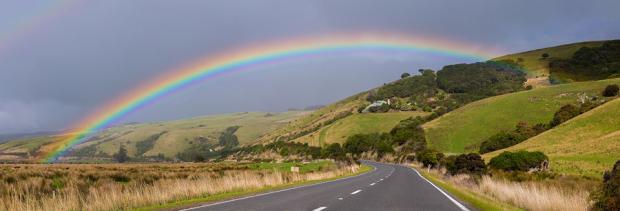It is clear that in next year’s legislative session in Olympia, Climate Solutions and other clean energy advocates will have a lot of work to do to address the climate pollution that comes from our largest source of it—transportation. We need both to clean up the fuels we use to get around and to reduce our reliance on driving alone— instead shifting toward more sustainable modes such as transit, biking, and walking. The way we currently fund transportation is a barrier to both of these imperatives. That’s why we’re gearing up now to confront this problem in the 2021 legislative session.
The Context: The Problem and the Solutions
About half of our state’s transportation revenue comes from a single source: the gas tax. As vehicles become more fuel efficient and as electric vehicles become more common, revenue from the gas tax will decrease. This creates a perverse incentive: to maintain our current funding, there is pressure to encourage less efficient, more polluting vehicles. The gas tax is also highly regressive, since it is a flat rate and lower-income people pay a higher proportion of their income on energy and transportation costs. Finally, the gas tax is inflexible. As mandated by the 18th amendment of the State Constitution, fuel tax revenue may only be spent on highway purposes—in other words, on road maintenance and expansion. This means that the gas tax locks us into an unsustainable transportation system, while more climate-friendly ways of moving around suffer from a lack of resources.
The solution? New transportation revenue sources that are climate-friendly, progressive, and flexible.
During next year’s legislative session, in addition to advocating for cleaner fuel solutions such as the Clean Fuel Standard, Climate Solutions will also be working on transportation revenue sources that will help solve our funding and climate problems. In 2020, along with our partners, we began working on some ideas that should be passed in the 2021 legislative session.
Progressive, Climate-Friendly Transportation Revenue
Air Quality Surcharge
An example of a climate-friendly and progressive revenue source is an Air Quality Surcharge, a one-time fee on the purchase of new vehicles that accounts for their anticipated lifetime carbon pollution. Such a fee would encourage the purchase of more fuel-efficient—or electric—vehicles, since fees for those vehicles would be much lower. And since it would only apply to new vehicles, not used vehicles, the policy will not unduly burden people with lower incomes. The Air Quality Surcharge could raise over $2.3 billion over six years, fully funding the state revenue gap created by the passage of Initiative 976.
Carbon Pricing
Whether it’s the Air Quality Surcharge or another funding source, it seems highly likely that carbon-based revenue (carbon pricing) will form part of next year’s transportation funding conversation. Senate Transportation Committee Chair Steve Hobbs published a new version of his proposed transportation revenue package, called Forward Washington, early this February. He included two versions of the proposal—and although each contains something like 20 new taxes or tax increases, each relies on either carbon taxes or cap and trade for over half of their new revenue. Committee Vice Chair Rebecca Saldaña has been sharing her own proposal, which includes both a carbon tax on transportation fuels and an Air Quality Surcharge. While we’re generally supportive of carbon pricing and are encouraged by the serious consideration multiple legislators are giving these proposals, we do wish to highlight a key caution—carbon pricing is a poor source of general revenue. That is, if its proceeds are not used to reduce carbon, the result will be either a failure to meaningfully reduce greenhouse gas pollution, or worse, runaway prices that will make the program untenable.
Many policymakers, and more than a few grassroots activists, have grown to believe that all we need to do is price carbon to remedy the climate crisis; but this is an oversimple misapprehension. Consider the example of Washington’s existing gas tax. It functions like a carbon tax equal to over $50/ton, and is the second-highest such rate in the country. In spite of this, our emissions not fallen in this sector; in fact, they’ve grown faster per capita in the Seattle metropolitan area than anywhere in the West. In view of these particular risks, it will be critical that revenue from carbon pricing is invested in large-scale carbon reductions. That includes reducing vehicle miles traveled by investing in transit and bicycle and pedestrian infrastructure. We must also pursue substantial electrification of our vehicle fleets and, in the case of an economy-wide system, buildings and industrial improvements.
Moreover, this set of realities is yet another reason a Clean Fuel Standard is so plainly necessary—it could be possible to support a higher number of laudable but unrelated state needs, like culvert repair, without disastrous consequences if the pricing system isn’t the sole driver of transportation sector reductions.
Road Usage Charge
We also need to move away from reliance on the inflexible, regressive gas tax to a system that more fairly funds road maintenance, as well as other transportation needs that reduce our impact on the roads. That is why Climate Solutions supports a Road Usage Charge (RUC) that phases in over time, starting now with electric vehicles. This would eliminate the unpopular, high annual registration fee EV drivers must pay, and instead shift to a system that charges for their road use, which varies by driver. Revenue from a RUC is not constitutionally-bound to serve only roads; instead, this revenue can and must contribute more comprehensively to building the mobility system we actually know we need. After all, the more people who are able to access transit rather than being forced to drive alone, the less congested our roads will be—reducing wear and tear and saving taxpayer dollars. Meanwhile, introducing a RUC among a limited number of drivers will help us get it right, so full implementation later on can be structured in a convenient, equitable way. And while many worry that a RUC will fall disproportionately on the poor, the reality is actually the opposite. Because the gas tax must be applied uniformly, a progressive structure is impossible, but with a RUC we can design a system that includes lower rates for vulnerable populations. The state is currently studying a RUC, and has instructions to evaluate related revenue choices. Climate Solutions will be involved in these discussions to ensure that revenue from a RUC is used to support safety and climate-friendly transportation, not endless road expansions.
We have a lot of work to do to fund transit, to make Washington's transportation system safe for all users, and to reduce the climate and air pollution it currently creates. That work has already started, and we would love your support. The failure of the legislature to meaningfully address the climate crisis this year means they have to do more in 2021. We will be there, both to provide innovative policy ideas and to hold legislators accountable.

